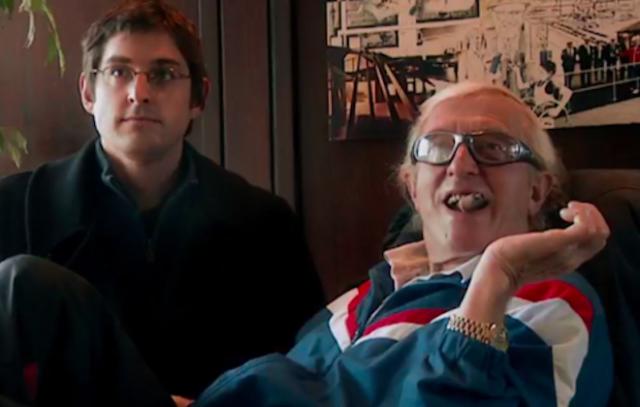Feature
When Louis Met Nick Pisa: watching two journalists examine their own work
TV Feature
Ed Williamson
4th October 2016
On TV this week: one journalist wrestles with his conscience and tries to understand where he went wrong, while another discusses with undisguised glee how he exploited a young woman's murder for personal gain.
Everyone bought the routine, because we love a Great British Eccentric. As Andrew O'Hagan, in his essential London Review of Books essay on Savile and British society in 2012, argued:

There is perhaps a regret in him that it was Louis Mk.1 and not the later upgrade that spent time with Savile, and Sunday's show saw him in the light of 2012's revelations interviewing victims, encouraging their criticisms of the original programme, and grappling with his own failure to get to the heart of the man. It is brilliant and, like Dan Davies's book In Plain Sight and anything else featuring detailed accounts of Savile's offending, difficult to sit through. At times you get the impression Theroux feels like he should carry the can for the whole thing, but of course there were so many others over so many years who had more to back up their suspicions and never spoke up. What shines through is that he is interested in examining his own failings, aware of his responsibilities as a journalist and keen to understand where he went wrong.
Over on Netflix, the big streaming beast launched – in the wake of a slew of new true-crime content it's been recommending for a couple of months, or maybe that's just the result of my viewing history – Amanda Knox, its documentary about the 2007 case of Meredith Kercher's murder. It's fairly nuts-and-bolts, but thorough, and has the trump card of featuring Knox herself, convicted and acquitted twice of the crime, talking earnestly and directly to the camera about her experience.
As a documentary it doesn't encourage you in either direction with regard to her guilt, but it is damning of the role of the press in the investigation. We're reminded of the transatlantic scale of the story and of how sexualised the coverage quickly became, with her "Foxy Knoxy" MySpace nickname becoming a fair-game headline sobriquet once it emerged that she – shockingly – had enjoyed sex in the past. Whether she did it or not, her convictions seem to have been based largely on her behaviour in the aftermath not following standard assumptions of how grief manifests itself, and the amplification of this in the press building a public image of a psychopath. (There were similar "Why aren't they more upset?" questions asked in the tabloids of Kate and Gerry McCann when they failed to adhere to the required distraught-parents script after their daughter Madeleine disappeared in 2007.)
The main talking head representing the print media is the Daily Mail's Nick Pisa, who was on the ground in Perugia for the story and recounts excitedly how brilliant the whole thing was: sexual intrigue, a juicy murder, a pretty suspect to hang the femme fatale tag on. He describes the rush at getting the front page, every journalist's dream.

You'd say he lacked self-awareness if it weren't so reminiscent of when in 2011 the crumpled and unrepentant former News of the World Deputy Features Editor Paul McMullan eagerly wheeled himself out to do the news interview rounds in the wake of the Leveson Inquiry. "Privacy is for paedos," he'd said when giving evidence, before advocating on every show that'd have him for a society in which a public figure's desire for a private life be taken as grounds for suspicion.
Unlike McMullan, Pisa doesn't bother with the paper-thin justification of his subjects as collateral damage of a necessarily free press; he simply omits any discussion of his journalism's moral implications. At one point, when the film has established that Knox was ultimately exonerated and that the physical evidence for her conviction was scant, he notes passively that "some of the information that came out was just completely made up", and asks us rhetorically what he was supposed to do: check the facts before publishing?
It's interesting to compare side-by-side the approaches of one journalist so self-reflective that he'll make a programme highlighting his greatest public failure in an attempt to understand it, and another so profoundly unconcerned with the truth. But Pisa is safe in the knowledge that he's giving the public what it wants, and that a reputation for taking pride in trivialising a woman's murder and destroying another's character isn't going to harm him a bit. 
Support Us
Follow Us
Recent Highlights
-
Review: Jackass Forever is a healing balm for our bee-stung ballsack world
Movie Review
-
Review: Black Widow adds shades of grey to the most interesting Avenger
Movie Review
-
Review: Fast & Furious 9 is a bloodless blockbuster Scalextric
Movie Review
-
Review: Wonder Woman 1984 is here to remind you about idiot nonsense cinema
Movie Review
-
Review: Borat Subsequent Moviefilm arrives on time, but is it too little, or too much?
Movie Review
Advertisement
And The Rest
-
Review: The Creator is high-end, low-tech sci-fi with middling ambitions
Movie Review
-
Review: The Devil All The Time explores the root of good ol' American evil
Movie Review
-
Review: I'm Thinking Of Ending Things is Kaufman at his most alienating
Movie Review
-
Review: The Babysitter: Killer Queen is a sequel that's stuck in the past
Movie Review
-
Review: The Peanut Butter Falcon is more than a silly nammm peanut butter
Movie Review
-
Face The Music: The Bill & Ted's Bogus Journey soundtrack is most outstanding
Movie Feature
-
Review: Tenet once again shows that Christopher Nolan is ahead of his time
Movie Review
-
Review: Project Power hits the right beats but offers nothing new
Movie Review
-
Marvel's Cine-CHAT-ic Universe: Captain America: Civil War (2016)
Movie Feature
-
Review: Host is a techno-horror that dials up the scares
Movie Review
